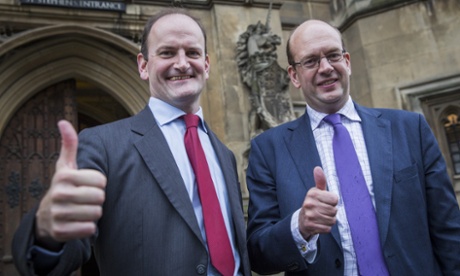
End-of-day summary
I’m wrapping up the liveblog now, but here’s a rundown of the day’s key developments.
- Mark Reckless, Ukip’s newest MP, has taken his seat in the Commons. Quizzed on whether there would be further defections from the Tory party, he said: “It’s such an individual decision … you can’t announce these things in advance.”
- Nigel Farage, the Ukip leader, has said that his party’s win in Rochester makes the next election “unpredictable beyond comprehension”.
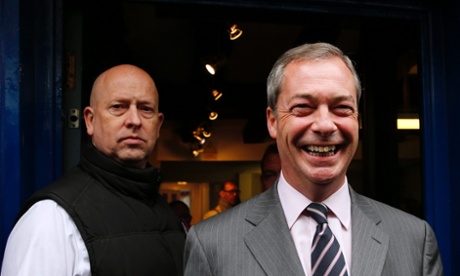
- But David Cameron has said he was “absolutely determined” to win back Rochester and Strood from Ukip at next year’s general election.
- Ed Miliband said Emily Thornberry had to step down as shadow attorney general for the “disrespect” shown in tweeting a picture of a house in Rochester with England flags and a white van outside. David Cameron described Thornberry’s behaviour as “completely appalling”.
- Following a dismal showing in Rochester, where the Liberal Democrats secured just 349 votes, party president Tim Farron admitted:
I spent quite a bit of time on the doorsteps of Rochester. I probably met all of the Liberal Democrat voters.
- Michael Gove, the Conservative chief whip, said Cameron was the “outstanding politician of our age” and wagered that even within the Miliband family the prime minister would win a majority when it came to the general election.
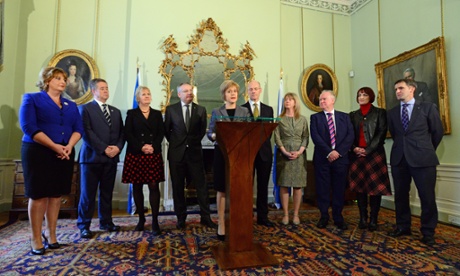
- Scotland’s new first minister, Nicola Sturgeon, unveiled her new cabinet, which has a 50-50 female-male makeup. She said:
The cabinet line-up is a clear demonstration that this government will work hard in all areas to promote women, to create gender equality and it sends out a strong message that we will start the business of redressing the gender balance in public life, starting right here in government.
That’s it for tonight. Thanks for reading and for all the comments.
Gove: 'Cameron is the outstanding politician of our age'
Michael Gove, the Conservative chief whip, has just been on Radio 4’s PM programme and endured a highly entertaining grilling (for listeners, at any rate) from Eddie Mair.
Mair was particularly taken aback by Gove’s assertion that David Cameron is “the standout politician of our age”. Pushed further, Gove confessed that by “our age”, he meant “contemporary front-rank politicians … those who are active now in politics”.
As PM, isn’t he supposed to be better than his frontbench and the opposition, Mair wondered.
Continuing in confident vein, Gove explained why the Tories are absolutely going to win in 2015:
Byelections tend to be occasions when people use the opportunity to send a message … Now just months before a general election, Labour comes a poor third with a leader less respected than Michael Foot.
If we continue to work hard … we’ll win. [Cameron] is winning the economic argument … We’re ahead in the opinion polls … There can only be David Cameron or Ed Miliband as prime minister after this election.
If you were to ask people in this country who is better equipped to secure our economic future, the majority would say David Cameron rather than Ed Miliband. If you asked the Miliband family, you’d have a majority saying David Cameron was the better person [to do that].
David Cameron is the standout politican of our age … of contemporary front-rank politicians … of those who are active now in politics, there is no one to match David Cameron.
Would you fly a national flag from your bedroom window, Mair asked him:
I haven’t any plans to at the moment but I think my son does.
And following the resignation of Emily Thornberry for her ill-judged Rochester tweet, Mair cites a tweet by Tory MP Steve Baker about the “scruffiest house in Feltham”.
Gove: I haven’t seen that tweet … one of the things I have learnt is it’s always unwise to comment on any document unless you’ve had the chance to read it yourself and see it in context.
He’ll go away and look at it, he says. Happy to help:
The scruffiest house I have seen in Feltham has a poster in the window: "Vote Labour". Great ad for them.
— Steve Baker MP (@SteveBakerMP) December 5, 2011
And finally, Mair asks whether Cameron’s reported comments about Mark Reckless’s “fat arse” were appropriate (the PM reportedly said that volunteers had “knocked on doors, stuffed envelopes, licked stamps to get his fat arse on the Commons benches, and this is how he repays them”).
Cameron spoke with “pungency and passion”, Gove says ; lot of Tory MPs are angry at the lack of loyalty shown by Reckless and fellow defector Douglas Carswell.
You can hear the interview here.
Updated
Here’s something to look forward to this weekend: home secretary Theresa May is appearing on Desert Island Discs on Sunday. My colleagues Matthew Weaver and George Arnett have conducted a forensic investigation into the choices politicians make when they dip their toes into the pool of potential embarrassment that is “what music do you like?”
They conclude:
The Prisoners’ chorus from Beethoven’s Fidelio and Elgar’s Enigma Variations are the pieces most requested by Tory politicians from their allotted eight discs.
Beethoven’s anthem of political freedom has been selected four times by Tory castaways including Edward Heath and Enoch Powell. And William Hague and Nigel Lawson were among another four Tories to have picked the Elgar piece that has become so associated with British identity.
But an alternative national soundtrack, Hubert Parry’s setting of the William Blake poem Jerusalem, is the clear favourite among Labour castaways.
(Plenty of flag-waving potential there, Ed Miliband must be pleased to note.)
Top requests by politicians
1. Enigma Variations (chosen by 9 politicians)
2. Jerusalem (8)
3. Prisoner’s chorus from Fidelio (6)
4. Beethoven’s Pastoral Symphony (5)
5. Nkosi sikelel’ iAfrika (5)
6. Chariots of Fire Theme (4); Joe Hill (4); We’ll Keep a Welcome (4); Rachmaninoff Piano Concerto number 2 (4); Puccini’s Madame Butterfly (4); Beethoven’s Piano Concerto number 5 (4); Twenty-Third Psalm (4); Beethoven’s Choral Symphony Number 9 (4)
Updated
Mark Reckless has just popped up on BBC News after his first day at work as a Ukip MP. “It’s good to be back at work,” he said, before turning his attention to the rerun of the Rochester and Strood campaign coming up in May:
A 3,000 majority is a good solid majority to campaign for a general election. I’ll be fighting that general election to win.
Voting for Ukip isn’t just about registering a protest, he insisted, arguing “We’re giving much clearer ideas about the policies we’re campaigning on”, such as today’s debate on the NHS and TTIP, and a constituency row over Medway hospital. His focus is to “get a hospital we can be proud of”, he adds.
(It’s probably fair to point out here that Reckless has of course been the constituency MP for Medway hospital for the last four years. He got into trouble during the byelection campaign when the chair of the Medway Hospitals NHS Trust complained about “misleading” information in Ukip leaflets, which implied NHS support for the party’s campaign.)
Still, his first day back in Westminster went smoothly, Reckless said, conceding that there weren’t many Tories there today:
A number of other MPs have been friendly, shook my hand, wished me well.
The first week or two of the campaign were difficult: the Conservatives were overconfident, treating Rochester and Strood as their private property, theirs to keep.
And Reckless can’t shake off that Polish plumber – asked by the BBC if the hypothetical handyman would have to leave Medway following a withdrawal of the UK from the EU, Reckless continued his backtracking:
We would want him to stay and I’ve only ever said I’d want him to stay … Anyone from the EU legally in the country is welcome to stay as long as they like.
He refused to produce a hint for those betting on the next Tory to defect:
It’s such an individual decision, you’d have to ask them. I’ve had conversations with two Conservative MPs during the campaign, there’s discussions but no more than that.
If there’s other MPs who believe as Ukip does, I hope they’d come and join us … But you can’t announce these things in advance.
Here’s the video of Ed Miliband explaining why Emily Thornberry’s lack of respect for the family whose house she photographed meant she had to leave the shadow cabinet:
So are there lessons to be learned from Rochester and Strood about the state – the end, even – of the two-party system? Alberto Nardelli, the Guardian’s data editor, has been taking a look. Tellingly, he notes, in 2010, the SNP, Ukip and the Greens combined won 6% of the vote. They are now polling at around 25%:
In a landscape historically dominated by two parties, first-past-the-post works relatively well. But, once votes are more distributed across a much bigger number of parties the method is less efficient, and the representativeness gap widens. On 6%, but with, say, only one member of parliament, the Greens would win 40 times fewer seats than they would under proportional representation.
There is of course an elephant in the room, which should not be ignored – Britons said no to changing the voting system in a 2011 referendum. Nevertheless, circumstances have changed over the past three years, and more importantly the representation gap matters if we look at the underlying reasons behind the fragmentation currently present in the country’s electorate – a crisis of trust.
Support is ebbing away from the two main parties:
Recent polls show the combined support for Labour and the Conservatives on around 60% – down by about 10 points on January. In elections since 1979, Britain’s two main parties won a combined 81%, 70%, 73%, 76%, 74%, 73%, 67%, and 65% in 2010.
Natalie Bennett, leader of the Green party, which came fourth in Rochester and Strood, garnering more than four times as many votes as the Lib Dems, has been speaking to BBC News. The boost to the Greens is down to the party’s “positive image”, she said:
People were saying to us, you’re the anti-Ukip vote … You stood up to Ukip.
But support for the Greens is not purely a protest vote, she claimed:
The ideas we’re presenting … as more people hear that message, more and more of them are voting for it. That’s really growing.
People are fed up with holding their nose and voting for people they hate. [They’re thinking] if I vote for what I believe in, maybe I can get something different.
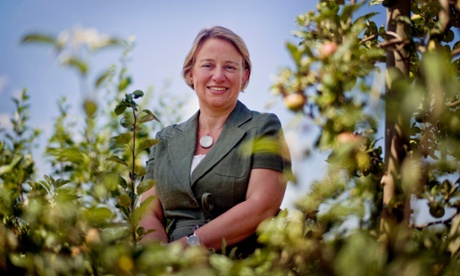
I’m sure it’s not just people outside the UK who might appreciate an explanation of the Emily Thornberry tweet fiasco, but my colleague James Walsh has put together this primer for anyone struggling to explain why Ed Miliband was last night “angrier than he has ever been”.
Updated
Mark Reckless might have hastened his arrival in Westminster as a Ukip MP in order to vote on a Labour MP’s private member’s bill on NHS privatisation, but as it turned out they didn’t really need his support. Clive Efford’s National Health Service (Amended Duties and Powers Bill) has been passed by 241 votes to 18, a majority of 223, at its second reading today.
As well as exempting the NHS from the TTIP (the Transatlantic Trade and Investment Partnership – a bit more on that here), Efford’s bill would repeal parts of the government’s controversial 2012 Health Act.
A victory at this stage might not mean much as the bill progresses and the coalition organises its troops to oppose it. But Andy Burnham, the shadow health secretary, has said the bill will form the basis of Labour moves to repeal the Health Act should it return to government in 2015.
Health minister – and NHS doctor – Dan Poulter spoke for the government in defence of the reforms and insisted TTIP wouldn’t affect the health service. But Efford told MPs today:
This bill is not the solution to all of the mistakes that this government has made in its top-down restructuring of the NHS but it is an important block to enforced privatisation.
If you believe that the National Health Service should be a pure market, open to competition regulations, where the interests of competition are put before National Health Service patients, then you belong on the side of the government.
If you believe that the NHS is a public service that should be free of competition rules and put the interests of NHS patients first, then you should vote for this bill today.
The bill takes a scalpel to cut the heart out of the hated 2012 Act and put right the worst of their mistakes.
Updated
But it’s bad news for others in Scotland today:
Been waiting for this. Salmond lookalike bemoans lack of work as Salmond stands down as FM. http://t.co/EEpsojsXJj pic.twitter.com/7hIVvPPBfN
— Jamie Ross (@JamieRoss7) November 21, 2014
Scotland's new cabinet
Stepping away from Rochester and Ukip and flags for a moment, the Scottish government has a new cabinet. New first minister Nicola Sturgeon has unveiled her team, which is 50% women, 50% men – a deliberate step, Sturgeon said:
Every member of the cabinet is part of this government’s top team on merit, on the basis of the excellent work they have already done as ministers.
The cabinet line-up is also a clear demonstration that this government will work hard in all areas to promote women, to create gender equality and it sends out a strong message that we will start the business of redressing the gender balance in public life, starting right here in government.
I said earlier this week that we will be leading by example on equal representation and encourage others to follow by addressing low pay and improving childcare. The cabinet appointments I have made today will ensure these issues have the highest priority.
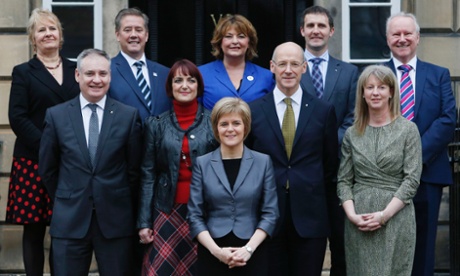
Here’s the new team:
- John Swinney becomes deputy first minister and stays as secretary for finance, constitution and economy.
- Keith Brown becomes secretary for infrastructure, investment and cities, promoted from transport minister.
- Roseanna Cunningham joins the cabinet as secretary for fair work, skills and training.
- Angela Constance becomes secretary for education and lifelong learning.
- Shona Robison becomes secretary for health, wellbeing and sport; was previously secretary for Commonwealth games, sport, equalities and pensioners’ rights.
- Alex Neil is secretary for social justice, communities and pensioners’ rights.
- Michael Matheson becomes secretary for justice; former public health minister.
-
Richard Lochhead stays as secretary for rural affairs, food and environment.
- Fiona Hyslop stays as secretary for culture, Europe and external affairs.
Lord Advocate Frank Mulholland and Solicitor General Lesley Thompson stay in their roles and attend cabinet.
Update: you can read Libby Brooks’ article on the new cabinet here.
Updated
A few commenters below the line have flagged the dressing-down delivered by Labour veteran MP (as it seems to be obligatory to describe him these days) Dennis Skinner to freshly-minted Ukip MP Mark Reckless, minutes after the latter took up his seat in the Commons this morning. The BBC has a video clip here, and I’ve grabbed some quotes from Press Association:
We dragged the National Health Service in 1997 to 2010 from the depths of degradation that the Tories left it in and hoisted it back to the pinnacles of achievement.
And I’ve got a United Nations heart bypass to prove it – and it was done by a Syrian cardiologist, a Malaysian surgeon, a Dutch doctor, a Nigerian registrar, and these two people here [Reckless and Carswell] talk about sending them back from whence they came.
And if they did that in the hospitals in London I for one would be dead in six months.
That’s the facts about Ukip as well.
Lib Dem voices have, perhaps unsurprisingly, been rather muted today. Rochester and Strood was never going to go swimmingly for them, but 349 votes is such a small haul that embarrassing doesn’t really cover it.
Lib Dem president Tim Farron has now broken cover to admit it had been a bad night. He’s told the World at One:
I spent quite a bit of time on the doorsteps of Rochester. I probably met all of the Liberal Democrat voters.
The Conservatives probably found that they had more people tactically voting for them from Labour and the Lib Dems than people who were actually Conservatives. They were all going Ukip.
Michael Gove, the Conservative chief whip who had a £50 bet on a Tory triumph in Rochester and Strood, has been talking to BBC News. Ukip’s victory isn’t troubling him or the party leadership, he insisted:
The majority is much smaller now … The Ukip bandwagon isn’t picking up momentum, quite the opposite.
The reality is that Ukip’s boasts about how well they were going to do turned out to be exaggerations.
Byelections are “no sure guide to the future” when trying to predict a general election result, he added:
While we’re never relaxed about the result of any election, we are confident [about May 2015]. All the evidence suggests … that David Cameron will be the choice of the majority of people to be the next prime minister.
And there is no chance of further defections from the Tory party to Ukip, he asserted:
The striking thing today is that Conservative MPs are completely united … It’s only through David Cameron that you can have a referendum on whether to stay in the European union.
And he gave a slightly lukewarm welcome to his former colleagues and now Ukip MPs:
Douglas Carswell and Mark Reckless have the same rights I have as members of the House of Commons.
The phrase “flogging a dead shadow attorney general” springs to mind, but the Sun – clearly keen to get the most out of its partnership with Dan Ware, the Strood man whose house was unwisely shared with us all by Emily Thornberry – has transported him to Islington to wave his flag outside Thornberry’s home.
New photo emerges of White Van Dan outside @EmilyThornberry's mansion: http://t.co/o7XwNU421X pic.twitter.com/ERllqR4h7y
— Guido Fawkes (@GuidoFawkes) November 21, 2014
Thornberry isn’t at home, of course – she cycled off to Westminster to vote in the Labour backbench amendment to exempt the NHS from TTIP.
Good afternoon, this is Claire Phipps, taking over from Andrew Sparrow, who I think has earned an early Friday finish. I’ll be liveblogging the fallout from Ukip’s win in Rochester and Strood, plus the rest of the day’s politics news. Do share comments below the blog or feel free to tweet me @Claire_Phipps.
Lunchtime summary
- David Cameron has said he is “absolutely determined” to win back Rochester and Strood from Ukip at next year’s general election. He was speaking as Westminster absorbed the impact of a byelection which saw all three main parties losing vote share. At one stage it was claimed that a Ukip victory would lead to Cameron facing a leadership challenge, and Cameron claimed a Ukip win could lead to financial “instability”. But the stock market has not collapsed, there is no sign of a leadership challenge and the Tories seem to think they have a reasonable chance of unseating Reckless next year. The rise of Ukip raises profound questions for all the main parties, but no easy answers have been on offer today.
- Mark Reckless, the new Ukip MP for Rochester, has taken his seat in the Commons so that he can vote for a Labour private member’s bill that would repeal parts of the Health Act. Clive Efford, the Labour MP sponsoring the bill, asked Reckless to explain why he voted for the Act when he was a Tory MP. Reckless said he was “guilty of believing the undertakings I was given by the front bench opposite.”
-
Ed Miliband has explained his decision to effectively sack Emily Thornberry as shadow attorney general for tweeting a picture of a house in Rochester with England flags and a white van outside. He said:
I was angry because I thought her tweet gave a misleading impression when she photographed a house in which the family lived that somehow Labour had the wrong view of that family.
It’s not the view we have of that family. Labour’s never had that view of disrespect and I’m afraid her tweet conveyed a sense of disrespect - that’s not my view, that’s not Labour’s view, it’s wrong, it never will be our view and that’s why I think it was right she resigned.
I thought there was nothing unusual or odd as her tweet implied about having England flags in your window - that’s why I was so angry about it and that’s why I think it was right she resigned.
The Labour MP John Mann said Thornberry’s behaviour was “horrendous”. He explained:
It insults people like me, it insults the people I know - my friends and family - Labour voters across the country because white vans, England flags, they’re Labour values and actually pretty routine Labour values for most of us.
David Cameron also joined in, describing Thornberry’s behaviour as “completely appalling”. (See 10.30am.)
That’s all from me, Andrew Sparrow, for today.
I’m now handing over to my colleague, Claire Phipps, who will be blogging for the rest of the day.
Updated
Nigel Farage flies the England flag at times, he told LBC.
Have I flown the flag of St George out of the window when we were playing football? Of course I have.
Mark Reckless is the first byelection winner to be sworn in on a Friday for almost 60 years. The Press Association has filed this.
A House of Commons spokesman said the last time a by-election winner was sworn in to the Commons on a Friday was on February 17 1956, when Edward du Cann took his seat for Taunton.
Here’s the Guardian video of Emily Thornberry expressing her tweet apology this morning.
Six (more) things we've learnt from the Rochester byelection
There are some good “what we’ve learnt” articles about the Rochester byelection. I flagged up three of them - a six-pointer, a seven-pointer and a 12-pointer - in a post at 10.48am.
Here’s my list, with six more conclusions.
1 - Ukip will find it difficult to campaign just on immigration. Mark Reckless started his re-election campaign focusing predominantly on immigration but, by the end, he was claiming that health was his key issue (even though he did not mention it once in the speech announcing his defection). It seems he was forced to change, partly under pressure from the Tories and partly because Medway hospital was a key issue for voters. This should encourage both Labour and the Tories. Ukip are very hard to beat on immigration, but on health (where Reckless has flip-flopped blatantly - see 9.54am) Ukip should have been vulnerable.
2 - All-postal primaries are not necessarily a good way of selecting candidates. The Conservatives invested considerable sums in an all-postal primary in the hope that this would give them a candidate with very broad appeal. Yet, in Kelly Tolhurst, they ended up with exactly the kind of candidate they would have obtained through a conventional selection, and actually a rather mediocre one at that. It is not even clear yet whether she will fight the seat again at the general election.
3 - Fighting as the local candidate doesn’t help if you’re running against the local MP. The Conservatives promoted Tohhurst as a candidate with impeccable local credentials, and in many byelections being local is extremely important. Yet Tolhurst was trying to out-local the local MP. Trying to play this for competitive advantage did not seem to work.
4 - Running as an insurgent doesn’t work if your main supporter is the prime minister. As well as promoting herself as a local candidate, Tolhurst also presented herself to voters as someone outside the Westminster establishment. (Faisal Islam explains that here.) Yet the prime minister made five visits to Rochester to support her, rather undermining the insurgency pitch.
5 - Having Cameron visit Rochester five times did not seem to help much - but it probably has not damaged his reputation much either. This morning Labour spinners have been selling the line that this was “a disaster for Cameron”. But, watching him on TV this morning, he does not seem to be diminished in any way as a political figure. (The idea that losing is a “personal humiliation” is another example of political rhetoric which may not be tethered to reality.) What is significant about Cameron’s visits, perhaps, is that they suggest he genuinely does enjoy campaigning. If so, over the next six months that’s going to be a bonus.
6 - Ukip are getting much better at campaigning. Quite how much better is a matter of dispute. One Ukip figure told me that their new data management system, which has had impressive write ups during the campaign, had been “very under-performing” and was not half as good as some of the newspaper stories implied. But their opponents are convinced the Ukip ground campaign has improved. “Since Newark Ukip has professionalised its campaign,” a Tory said. “Now, when they do things, they do them for a reason.” There is more on this here.
Lucy Powell, Ed Miliband’s new deputy election chair, told the Daily Politics that Emily Thornberry had to resign because she had insulted voters.
I would be deeply angry is someone came down my road and took a picture of my house and put it on the internet, as would most of the people watching this programme. That is not an acceptable behaviour for a member of parliament ...
She put on the internet a picture of somebody’s house which left question marks over why she had done that, what she was trying to say. That was deeply insulting. She apologised and she’s resigned.
But Powell came slightly unstuck when Andrew Neil, the presenter, asked her what it was that Thornberry was trying to say. Powell replied:
I don’t know. But I don’t think it was acceptable and that’s why she’s resigned.
Powell also said that Miliband had been “extremely cross” about this and she effectively confirmed that Thornberry was sacked. Powell said:
At first Emily hadn’t quite realised the seriousness of what she had done. After speaking to Ed Miliband, she did. And that’s why she offered her resignation.
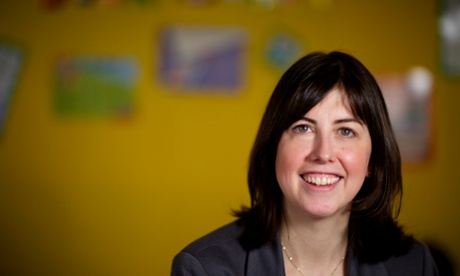
Michael Gove told the Daily Politics that Mark Reckless spoke against the government’s Health Act in the Commons debate this morning. Yet Douglas Carswell, the other Ukip MP, was an enthuiastic supporter of these measures when he was a Conservative MP, Gove said. He claimed this amounted to the new, two-strong Ukip parliamentary party being split down the middle within an hour of Reckless’s arrival.
Michael Gove, the Conservative chief whip, is talking about the byelection. He says the party did much better than expected at the general election and that he is confident that Kelly Tolhurst, the candidate, will win in Rochester in 2015. (Less than an hour ago a party official said that no decision has been taken yet as to whether she will even stand next May.)
Mark Pritchard, the Conservative MP, told BBC News that he thought Ukip would eventually get caught out trying to say different things to different audiences.
If you look at Ukip, they’re saying one thing in Chesterfield, they’re saying more spending for the NHS, but in Chelmsford they are saying privatise the NHS, and they can’t have it both ways. Even though Nigel Farage is a shrewd political operator, he is not a political acrobat and if you try and ride two horses, one on the left, one on the right, eventually you will take a political tumble.
The Tories have unearthed an electoral statistic which they believe illustrates how much trouble Labour is in. They say that, since the 1950s, no opposition has won an election without achieving a net gain in the byelections held during that parliament.
And Labour has not secured a net gain, they say. It gained Corby from the Tories. But this was cancelled out by the loss of Bradford West.
Ed Miliband explains why Emily Thornberry's tweet was unacceptable
Ed Miliband has given a short statement to broadcasters about Emily Thornberry’s tweet. He said it conveyed a sense of disrespect for the family living in the house, and gave the impression that it was wrong or unusual to fly the England flag. “That is not my view, that is not Labour’s view, that will never be Labour’s view,” Miliband said.
Updated
In his victory speech Mark Reckless said that it was now “not Ed Miliband, but Ukip, that represents the concerns of most working men and women”. (See 8.42am.)
That sounds a bold claim. But, if you judge a party by the social class of its supporters, it is justified. In Sex, Lies and the Ballot Box: 50 Things You Need to Know about British Elections, Matthew Goodwin has an essay saying “Ukip is Britain’s most working-class party”. Here’s an extract.
Yes, [Ukip’s] base is very socially distinctive: but it is blue-collar, poorly educated, old, white and male. Far from a rebellion of the golf club, Ukip is Britain’s most working-class party. Indeed, to find a party support base that is as disproportionately working-class you need to go back to the Labour party in the early ‘80s, and the days of Michael Foot. Since 2010, the voters who have flocked to Farage look more like Old Labour than True Blue Tories: they are older whiter men, working-class, struggling financially and poorly educated.
Sex, Lies and the Ballot Box is a terrific book. Academic writing about politics is often virtually incomprehensible, but Philip Cowley and Robert Ford, the editors, have persuaded dozens of leading academics to present their findings clearly and concisely, in short essays. Anyone interested in voting and elections would find it enlightening. If I could make it compulsory reading for people who follow my blog, I would (although we’re a liberal organisation, and so making anything compulsory would not be very Guardian.)
Here’s a Guardian video of Mark Reckless’s victory.
A Rochester byelection reading list
Here are four analysis articles about the byelection result that are worth reading.
David Cameron says Emily Thornberry's white van tweet 'completely appalling'
David Cameron has imposed a ban on Tory MPs posting tweets of white vans, or houses with England flags.
At least, that’s one interpretation of what he’s just said on BBC News. He was asked if he would have fired one of his frontbenchers out for sending out the picture that Emily Thornberry posted, and saying what she said.
He could have said: “Well, she says she did not intend to sneer, it was only a photo, and it’s best to keep these things in perspective.”
But, surprise, surprise, he didn’t. When asked the question he actually he replied:
Absolutely. Let’s be clear: Emily Thornberry is one of Ed Miliband’s closes allies and aides, and effectively what this means is Ed Miliband’s Labour party sneers at people who work hard, who are patriotic and who love their country. And I think that’s completely appalling.
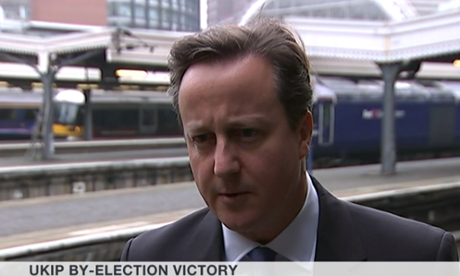
(Perhaps lack of sleep is affecting my judgment, but I’m beginning to think the political narrative has finally lost all contact with reality.)
Updated
Mike Smithson at Political Betting says the bookmakers are split over whether or not the Tories will retake Rochester at the general election.
Bookies split on whether CON will retake Rochester at GE15 William Hill http://t.co/orbZ1ewJDz 2/1 Ladbrokes http://t.co/ZlibygoyoN 4/6
— Mike Smithson (@MSmithsonPB) November 21, 2014
Emily Thornberry spoke to Sky News this morning about her decision to resign yesterday over her white van tweet.
I think what I have to say is really a repeat of what I said last night. Which is that I got it wrong, I made a mistake, I’ve resigned, and if I’ve upset anyone or insulted anybody, I apologise. I’m going in this morning to vote on a really important bill for my constituents, which is about the privatisation of the national health service, which we’ve got to stop. So I’m going in now and serving my constituents. That’s all I’m going to say.
Earlier this week David Cameron said a Ukip victory in Rochester could lead to financial “instability”. This morning, on Twitter, he has made a rather more measured version of the same claim, pledging also to win Rochester back at the general election.
I'm determined to win back Rochester and Strood at the election - anything other than a Conservative Govt would put our recovery at risk.
— David Cameron (@David_Cameron) November 21, 2014
This is what Paul Hobday, from the National Health Action party, said earlier this week about Mark Reckless’s decision to back the Efford bill.
Mark Reckless supported the Health & Social Care Act, which is a privatisation-enabling Act, at every stage. Now he has swung 180 degrees and is to vote (if re-elected) for the Efford private members’ bill which will rein in privatisation.
Mr Reckless has also signed the People’s NHS pledge to “keep the NHS out of TTIP” which is also a turnaround and strange for someone belonging a party prioritising business and free trade. Ukip claim to be separate from the old Westminster cynical “establishment” and a breath of fresh air but this proves they are no better than the rest with political opportunism. Ukip’s NHS policy is a mess.
As well as exempting the NHS from the TTIP, it repeals parts of the Health Act.
During the byelection campaign Labour’s candidate, Naushabah Khan, said she would take her seat first thing on Friday morning to enable her to vote with Efford. Labour checked the Commons rules to make sure that this was possible, and challenged the other parties to say that they too would do the same.
When I asked Reckless’s press officer yesterday if Reckless would be voting for the Efford bill if he won, the press officer was non-committal. But he said that Reckless had signed the People’s NHS pledge to “keep the NHS out of TTIP”.
Mark Reckless takes his seat in the Commons.
Mark Reckless has taken his oath. He was accompanied by Douglas Carswell and Philip Hollobone.
It is unusual for an MP to take his seat so early, but Reckless is doing so so that he can vote today with Labour to exempt the NHS from the EU/US trade deal, the transatlantic trade and investment partnership.
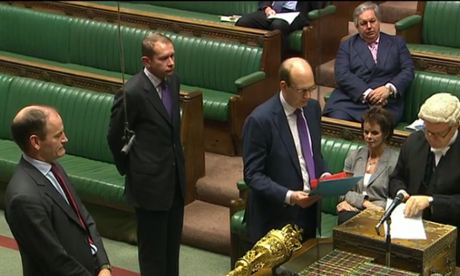
Updated
Mark Reckless is in the Commons. He is taking his seat now.
Douglas Alexander's interviews - Summary
Douglas Alexander, the shadow foreign secretary and Labour’s head of election strategy, has been giving interviews to Today and other programmes this morning about Rochester. Here are the key points he’s been making.
-
Alexander said Labour could not afford to take voters for granted, and that MPs had to show “deep respect” towards the people that put them into power.
Anybody who wants to stand for election and be successful in being elected next May has to start with a fundamental and deep respect for the voters to whom we are asking for support.
-
He said that Ed Miliband was very angry about Emily Thornberry tweeting a picture of a house with white van and England flags.
The anger that Ed felt when he saw that tweet reflected his understanding that actually we need to earn the support of people right across this country.
I understand he did not hold back in making clear how angry he was that this would lead to widespread misinterpretation, not just as to Emily Thornberry’s motives in posting that tweet, but would lead to the kind of conversations we’re having now. Frankly, instead of having a conversation about politicians, we in the Labour party should be talking to the public about what they are concerned about. And this tweet didn’t make that task any easier.
-
He said there was no “magic” solution to the challenge posed by an alienated electorate.
The party that will win will be the one that in the months ahead best answers the undoubted anger and sense of alienation that voter feel today ... My sense is that the principle fuel in Ukip’s tank is more anti-politics than even anti-Europeanism. There is anger at the way that the country is run, and how it’s run for, and people feel shut out of the economy and ignored by politics. There is no single policy answer to this, no magic policy, no speech or campaign tactic that can address all of the disengagement that people feel. These are trends that have built up over decades rather than overnight. And you have to defeat that cynicism and alienation with practical answers. But that has to be done conversation by conversation, doorstep by doorstep, street by street, community by community.
-
He said Rochester was the kind of seat Labour would only win if it won a landslide nationally.
We’ve been campaigning hard, but the truth is this was a landslide seat for Labour, not a majority seat. It was number 124 on our target list and in that sense of course we were going to be under pressure.
Mark Reckless's victory speech - Summary
Mark Reckless’s victory speech was fascinating. As well as channelling William Hague at one point, he also sought to position Ukip as the party of the working class, and a “radical” force acting in the tradition of the Levellers, the Chartists and the Suffragettes. Douglas Carswell did something rather similar in his victory speech in Clacton last month, which was another remarkable exercise in repositioning.
I can’t find a full text of the Reckless speech on the web, but here are the key points.
-
Reckless said Ukip was now the “radical” party that represents the interests of working people.
Thank you too to the Labour voters who switched to Ukip with me in such numbers. I say to you that the radical tradition in Britain is a noble and high-minded one. It is the tradition that took power away from the elites and spread it to the people. It’s the traditon of Levellers, Chartists and Suffragettes. It is the tradition that gave us appointment on merit, Gladstonian finance, universal suffrage, religious freedom and racial tolerance. It is the tradition about which I spoke in my maiden speech in parliament. I’m not sure if I’m allowed a second. But if I were, I would say the radical tradition, which has [done so much for] the working class, has found a new home in Ukip. As Labour represents those comfortable with at the top of the public sector, it is not Ed Miliband, but Ukip, that represents the concerns of most working men and women .
-
He said that Ukip was attracting support from all groups in the community, including from ethnic minorities, and that Ukip supporters valued Britain’s links with other countries abroad.
So how did we win here? By earning support from every section of the community, from students and pensioners, from professionals and unemployed people, from people of African heritage recently moved here from south east London, and those who made the move long before, from Sikh and Muslim communities, and from [people from] many Commonwealth backgrounds. People in Medway cherish Britain’s links to distant, fast-growing continents. We want to lift our eyes and horizons beyond Europe. We are linked by commerce and kinship, by language and law, and by [having a shared history with] the wider English-speaking world.
-
He said Ukip must be a multi-cultural party. EU migrants living in the UK were now were “part of our community” and “always ... welcome”, he said.
I enjoyed more than a dash of support from people who came here from other EU states. People who feel ... attracted by our strong economy, our open society and a better future. [They] come to Britain because of the opportunities we offer as we create more jobs than the rest of the EU put together and because of what makes our country special. They are now here as part of our community and they will always be welcome.
If Ukip is to win nationwide - and we have proved tonight that we can - it must do so on that basis. We most be a party that speaks to and for the whole nation and everyone who lives within it.
-
He defended politics as a calling.
Politics is not a popular calling. It takes real grit to put yourself forward for election. Yet politics is the alternative to anarchy or depotism. We are blessed here to take it for granted.
- He said the people were his “boss” and that he would not forget that.
-
He said, if Ukip could win in Rochester, it could win anywhere.
Rochester and Stood was our 271st most winnable seat. If we can win here, we can win across the country. If you vote Ukip, you get Ukip.
-
He urged people to join Ukip to allow it to “give you back your country”.
Whichever constituency, whatever your former party allegiance, think of what it would mean to have a bloc of Ukip MPs at Westminster large enough to hold the balance of power.
If you believe in freedom, if you believe in low taxes, if you believe in clean government, if you believe in localism, if you believe in people power.
If you believe that the world is bigger than Europe, if you believe in an independent Britain, then come with us and we will give you back your country.
This last line was a direct lift from a speech that William Hague gave when he was Conservative leader.
But the rest of it sounded as if he had been influenced by the writing of Carswell, or even Daniel Hannan, the Eurosceptic Tory MEP and a close friend of Carswell and Reckless. Hannan has written a book about the Anglosphere, and its role in promoting freedom, and phrases like “linked by commerce and kinship” sounded Hannan-inspired.
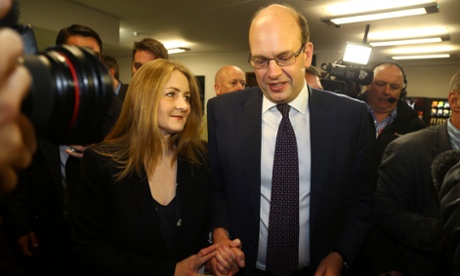
It’s Lord Ashcroft’s polling that has given the Tories confidence that they can win back Rochester in 2015. (See 7.23am.)
But the former Conservative deputy chairman is warning his colleagues not to be too complacent.
The Conservative Party shouldn't get too cocky about winning Rochester back at the GE. A positive rather than a negative campaign needed.
— Lord Ashcroft (@LordAshcroft) November 21, 2014
Updated
Hague says people want a referendum on the EU. They will only get one by voting Conservative.
Q: Cameron went to Rochester five times. He was defeated. That reflects badly on him.
Hague says that reflects the fact he leads from the front.
Other prime ministers thought byelections were beneath them. Cameron doesn’t, Hague says.
William Hague's Today interview
William Hague, the Conservative leader of the Commons, is being interviewed on the Today programme now.
Q: What would your message be to Tory MPs thinking of defecting?
Hague says he would tell them the next election is a choice: either David Cameron will end up prime minister, or Ed Miliband.
Q: You as a party said you could beat Mark Reckless.
Hague says Ukip only won by 7 percentage points. That is less than half what Ukip were predicting only a few days ago.
Hague says he was elected in a byelection. Byelection results bear little resemblance to general election results.
Q: This was Ukip’s 271st most winnable seat.
Hague says that calculation does not really apply when a sitting MP defects.
If Ukip takes seats from the Conservatives, Miliband will become prime minister by default.
Sarah Wollaston, the Conservative MP, has used Twitter to say that her party must not respond to the Rochester result by lurching to the right.
Tories have lessons to learn from the #RochesterandStrood campaign, but that must not include a lurch to right or a vile scapegoating agenda
— Sarah Wollaston MP (@drwollastonmp) November 21, 2014
Nick Robinson, the BBC’s political editor, has taken to Twitter to refute something Nigel Farage said in his Today interview.
Talking about Mark Reckless’s comment suggesting he would favour repatriating EU migrants, Farage said Reckless had been asked a complicated question.
Good day for @Nigel_Farage but he can't keep saying that @MarkReckless was asked a complicated question on immigration 1/2
— Nick Robinson (@bbcnickrobinson) November 21, 2014
He was asked whether a Polish plumber should be deported. Not complicated & not about illegal immigrants or transitional arrangements 2/2
— Nick Robinson (@bbcnickrobinson) November 21, 2014
Nigel Farage's interview on Today
Nigel Farage, the Ukip leader, is being interviewed on Today.
He says people should ignore political commentators.
In May they said Ukip could not win a parliamentary seat. Then they won Clacton.
After Clacton, they said Ukip would not win Rochester. But it did, says Farage.
Farage says the people who want to vote Ukip want to vote Ukip in every election.
Q: Stewart Jackson, a Conservative MP, says Tory MPs would be mad to defect to Ukip on the basis of this.
Any Tory MP who defects to UKIP on the basis of the result in Rochester and Strood (whatever it is) would frankly be completely insane
— Stewart Jackson MP (@SJacksonMP) November 20, 2014
Farage says that, if Jackson stays in the Conservative party, he will lose his seat.
Q: Will there by byelections if you have more defections?
Farage says there is a supposed convention that you don’t have byelections six months before an election. But he would love the byelections to go on for ever.
Q: You’ve been exposed on policy?
Farage says people should watch Mark Reckless’s acceptance speech last night. He made it clear migrants would be allowed to stay.
On the NHS, Farage says he suggested a debate. He wanted to look at the French model. The party had a debate, and then decided to keep the present system, but cut the bureaucracy.
Q: People think you want to change the NHS, but found it was politically unacceptable.
Farage says he has spent his whole life challenging everything.
He also says Labour is anti-English.
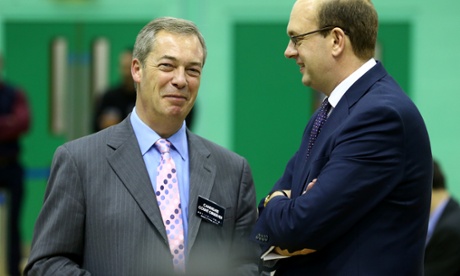
Updated
On the Today programme, Peter Kellner, the YouGov president (and the effective winner of the press room sweepstake on the Rochester result), said he did not think Mark Reckless would be able to hold Rochester in 2015.
They need a big cushion to hold it at a general election. I don’t think Mark Reckless’s cushion is big enough, either here in Rochester next May or for other Conservative MPs who are thinking of defecting ...
He had a 3,000 majority. It takes a swing against him of less than 4% and he loses the seat.
Hague says Tories will win Rochester back at the general election
William Hague, the Conservative leader of the Commons, has been responding to the Rochester result on the airwaves this morning. He said the Tories would regain the seat at the election.
We can, and I believe we will, win this seat back at the general election when the future of the government is actually on the ballot paper, the whole future of the economy is at stake.
I think by-elections are difficult, I know that, I won a by-election 25 years ago, it’s very unusual for the party in government to actually win a by-election, it’s very unusual. People think they can cast a protest vote, and have a free kick, as the future of the government is not on the ballot paper.
But it was still a small majority for Ukip, a terrible result for the Labour party. We have to get the message across that Ed Miliband is trying to sneak into Downing Street on the back of a strong Ukip performance, that’s all he’s got left going for him. In a general election, people need to vote Conservative.
There is some polling evidence that Hague is right. Lord Ashcroft, who commissioned a byelection poll, included a question about voting intention for the general election and he found that, although Ukip was on course to win the byelection, it was not on course to win in 2015. Here’s an extract from his commentary.
Though Mark Reckless looks set to be returned to parliament next Thursday, the evidence is that he can expect a battle next May. Of those naming a party, 36% of Rochester voters said they would probably vote Conservative at the general election, 35% UKIP and 21% Labour. Just under three quarters (72%) of UKIP by-election voters said they would stay with their party next year, with 11% saying they would switch to the Tories and a further 11% saying they did not know what they would do.
John Mann, the Labour MP, is on the Today programme now. He says Emily Thornberry’s tweet was “horrendous”. It was an attack on normal Labour values, he says.
He welcomes the fact that Ed Miliband responded so quickly. Miliband is applying the “Doncaster north” test, he says. Mann says Miliband should apply this test to all Labour policy; how would it play in Doncaster, Miliband’s constituency.
People have criticised Miliband in the past. But his speed in reacting this time is what people wanted to see. This represents a “step change”, he says.
Labour’s problem at the next election will not be Ukip, he says. Ukip will be a small problem. The main problem will be getting people to vote.
Ukip has given Westminster’s two-party political system (or three-party system, depending on how you look at it) another dramatic clobbering.
For the second time in as many months, a Ukip MP has been elected to parliament. Mark Reckless, who defected from the Conservatives in September, regained his Rochester and Strood seat, with a majority of just under 3,000.
The Conservatives and Labour both saw their share of the vote significantly, and the Lib Dems endured their worst result in a byelection ever. They got less than 1% of the vote, and came fifth behind the Greens, who got more than four times as many votes.
Here’s a table with the results in full.
Mark Reckless (UKIP) 16,867 (42.10%)
Kelly Tolhurst (C) 13,947 (34.81%, -14.39%)
Naushabah Khan (Lab) 6,713 (16.76%, -11.70%)
Clive Gregory (Green) 1,692 (4.22%, +2.69%)
Geoff Juby (LD) 349 (0.87%, -15.39%)
Hairy Knorm Davidson (Loony) 151 (0.38%)
Stephen Goldsbrough (Ind) 69 (0.17%)
Nick Long (PBP) 69 (0.17%)
Jayda Fransen (Britain 1st) 56 (0.14%)
Mike Barker (Ind) 54 (0.13%)
Charlotte Rose (Ind) 43 (0.11%)
Dave Osborn (Pat Soc) 33 (0.08%)
Christopher Challis (Ind) 22 (0.05%)
UKIP maj 2,920 (7.29%)
Electorate 79,163; Turnout 40,065 (50.61%, -14.32%)
And here’s the other key story of the night, the resignation of Emily Thornberry after being accused of snobbery when she tweeted a picture of a house decked out in St George’s flags.
Today I’ll be covering all the reaction to the byelection. Nigel Farage, the Ukip leader, is expected to hold a news conference this morning, and journalists are wondering whether he will announce another defection.
But I’ll also be trying to address the key question: Is this just a temporary insurgency? Or does Ukip really have the capacity to disrupt, perhaps permanently, the political establishment?
If you want to follow me on Twitter, I’m at @AndrewSparrow.







